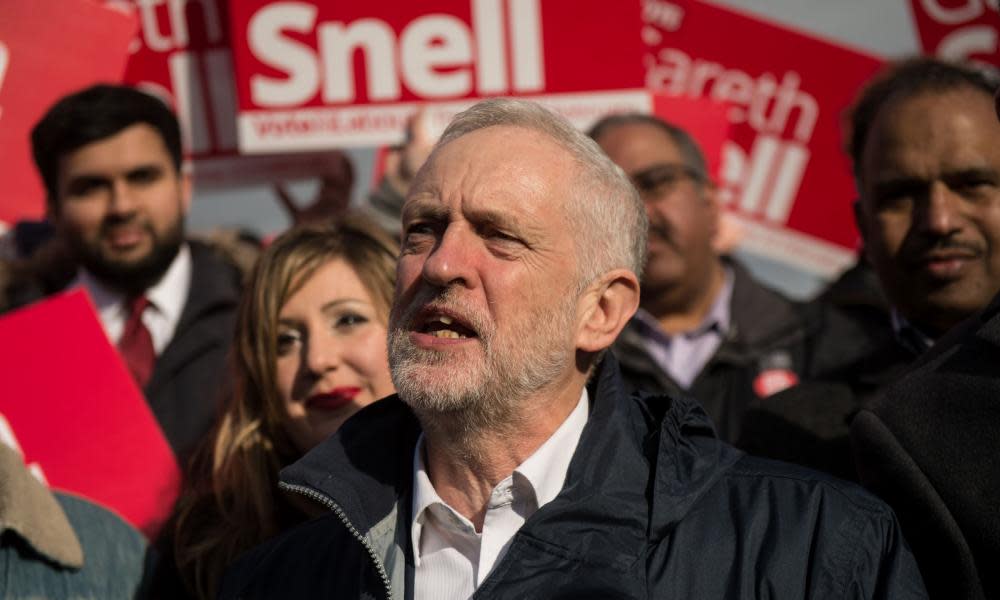The Guardian view on the byelection results: a test for Mr Corbyn | Editorial

What happens when you know all about an impending catastrophe but somehow cannot take it seriously? Labour’s Jeremy Corbyn is in danger of finding out. It cannot be much cheer that the opposition won just one out of two seats it has held for more than half a century. Last night’s capture of Copeland for the Conservatives is a big political event by any measure. Copeland – and its predecessor seat – had been Labour since 1935. It was the first time a sitting government had won a byelection since 1982. It is an exceptional result for Theresa May and a humbling one for Mr Corbyn. Some of that is down to local factors, in particular the Labour leader’s dislike of the nuclear power industry on which west Cumbria is so economically dependent. It is worth recalling that even when Labour ran on a more visceral anti-nuclear manifesto in 1983, voters in Copeland backed the party. The region is one of many in which traditional Labour voters still balk at switching to the Tories, but when so many jobs are at stake it can happen. Copeland is also a whiter, wealthier constituency than average – and also importantly one with a larger manufacturing base than that usually found. It is the sort of seat that Labour needs to keep hold of in the north. The Tory win underlines Mrs May’s and the Tories’ growing ascendancy. It also hints at the larger potential of Mrs May’s conservatism to capture the centre ground of English politics – though she will have to persuade her party too.
Parliamentary byelections always tell an important story, but care is needed in putting those stories into a national context. Labour held on in Stoke Central, a contest in which many initially wrote them off. The Liberal Democrats’ recent surge was not repeated either. In some ways the biggest loser this week was Ukip. When the two byelections were triggered, many assumed that the two seats, Stoke in particular, might be Ukip’s for the taking. Perhaps they might have been if the view that Brexit has revolutionised everything had been right. But it wasn’t. Ukip’s arrogance, divisions and obsessions were not what the voters turned out to want. Paul Nuttall, the party leader, staked his future on winning in Stoke. His flaws were ruthlessly exposed, in the press and on the stump. His future must therefore be in doubt. Another round of the Ukip leadership soap opera may beckon. Ukip is not dead. But claims that it is poised to sweep Labour aside have underestimated the good sense of the voters. Yet the byelection results support a second important conclusion as well. They seriously undermine the lazy assumption, peddled especially by some of the rightwing press but swallowed also by some in the Labour party, that the Brexit referendum has redefined British party politics at a stroke. Both of these constituencies were very clear Brexit supporters in 2016. Yet their votes for Brexit did not give the byelections a new shape. Instead their shape is recognisably an old one. In Stoke, the shifts in party share of the vote between 2015 and 2017 were small. Even in Copeland, they were modest. These byelections look more like traditional contests between England’s four main parties (five if you count the Greens) than local reruns of the Brexit argument. They were arguably at least as much about May v Corbyn as about Britain and the EU.
This is not good for Mr Corbyn. The Tories have, according to our latest poll, an 18-point lead over Labour. Labour MPs and trade unionists are right to fret about the party’s prospects. It is a concern that Mr Corbyn refuses to shift tack from campaigning on issues such as the NHS and social housing which failed to energise voters. Politicians are often blinkered, inclined to see what they want to see and have supreme confidence in their own abilities. However, unwarranted optimism must evaporate when confronted by hard truths. Labour should have retained both seats with ease if it was an effective opposition. In some of the earlier byelections in this parliament – such as Oldham West, Sheffield Brightside and Tooting – Labour did quite respectably. But not this week. There is nothing here for Labour to celebrate. The 2015 election was already a low base, from which Labour has once again declined. These results point to the continuing erosion of the Labour party as a credible governing party in modern Britain under Mr Corbyn. Maybe this is not terminal decline, but that is hardly a consolation for Labour wellwishers. Yes, Labour survives. But to what end? What is today’s Labour party for? This is a question which needs a better answer than Mr Corbyn is offering.


